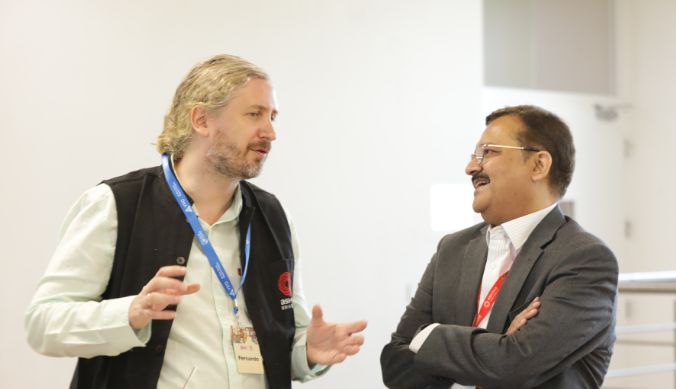Science Policy Initiative of Ashoka University
Ashoka University (AU) has set up a Science Policy Initiative (SPI) in 2019 to complement the efforts of the University’s Faculty of Sciences and spur innovation as well as continuous learning into the knowledge ecosystem.

Office of PR & Communications
3 January, 2021 | readScience and Technology are instrumental in enhancing scientific innovation, economic performance and social well-being. India’s historical contributions in this space have been quite remarkable. Given the significant role that the academic community has been contributing in this field, it is the right time to reinforce the strategic connect of academia with the government and the industry for streamlining national thought leadership and policymaking on India’s science, technology and innovation landscape.
Ashoka University (AU) has set up a Science Policy Initiative (SPI) in 2019 to complement the efforts of the University’s Faculty of Sciences and spur innovation as well as continuous learning into the knowledge ecosystem. SPI aims to promote data-driven research, policy work and advocacy on India’s science, technology and innovation space. With the broader agenda of contextualising and reinforcing the efforts of the scientific community in India, the Policy Initiative acts as a knowledge hub, encouraging deliberations on issues related to science and technology.
This policy initiative of the University strives to act as a resource body for the government and industry by conceptualising and preparing high-quality evidence-based policy briefs, recommendation notes, background papers, presentations and other targeted resources for meetings and conferences with key stakeholders from the government, academia and the industry. Going forward, SPI will also aid the translation of science research and policy discussions into sound policies through persuasive advocacy and working with the government.
Within a thriving culture for expression, research, practical support and thought leadership, Ashoka University renders SPI the right environment for policy research and capability building.
Vision and Objectives
- Become Ashoka’s nodal policy arm and an effective S&T resource conduit between the government and industry
- Assist in translation of science research, stakeholder consultations and discussions into sound policies through persuasive advocacy.
- Foster knowledge exchange on S&T and innovation.
- Promote quality-driven and evidence-based advanced research in S&T
- Strengthen academia – R&D initiatives – industry collaborations
- Further research and higher education in science policy as a subject.
- Strengthen India’s global competitive foothold in S&T.
Significance to AU and Activities
AU, the leading liberal Arts and Sciences University has been striving to achieve excellence in higher education through its well-renowned faculty, world-class infrastructure and by its specialised way of delivering higher education. The Policy Cell serves as conduit to strengthen thought leadership, academia-government-industry inter-linkages, persuasive policy advocacy and outreach of AU. Its significance is broadly outlined in the flow chart below.
Flow Chart
Since its inception in July 2019, SPI has been undertaking a series of activities. They are classified into the following 3 heads:
1.Thought leadership: SPI collaborates with the best faculty, researchers, practitioners and students to identify potential research areas in the domain of science and technology. It features evidence-based and independent research white papers, policy briefs, policy perspectives, which contribute to AU’s voice in facilitating sound policy-making. Some examples are: White Paper on Rare Diseases :
Rare diseases in India: time for cure-driven policy initiatives and action
White Paper on Artificial Intelligence: Enabling a $5 Trillion Indian Economy: A policy framework to catalyse AI-centric technology ecosystem
Policy Brief on Blockchain Technology: Landscaping Priority Areas for Blockchain: Cryptoeconomics, Capacity building, Scalability, Security
2. Persuasive advocacy and collaborative initiatives: One of the important tasks of the Science Policy Cell is to also take up collaborative projects and initiatives in partnership with the government, industry and other academic community; projects which help decision-makers design, adopt and implement policies informed by evidence, independent science and well-grounded analysis. Besides, knowledge initiatives are also undertaken which help streamline AU’s growth and sustainability. Some of these include, input feeds to the government on policy matters like STIP 2020, Suggestions on preparedness to deal with COVID-19 and other pandemics in future, funding proposal on DCKC (Effective Education), funding proposal on proposed Centre for Health Metrics, strategy formulation on academia-industry partnerships, Implications of NEP 2020 for Ashoka University, etc.
3. Stakeholder consultations and engagements: AU’s Science Policy Cell conducts focused policy discussions, symposia, policy roundtables, workshops, and webinars involving relevant stakeholders from the government, academia and the industry. The idea is to discuss the potential opportunities to leverage on, challenges to overcome as well as help streamline a roadmap in the field of Science and Technology, which could beneficial for the policymakers in suitable formulation and implementation of strategies, plans and policies. Some of the consultations which have been conducted are in the fields of blockchain technology, artificial intelligence and public health.
For example:
Landscaping Priority Areas for Blockchain: Cryptoeconomics, Capacity building, Scalability, Security (January 2020): A policy discussion was hosted on blockchain technology with distinguished subject experts and thought leaders from the government, academic community and the industry, to discuss and exchange ideas on key policy aspects that could be explored on BT in the Indian context, to leverage its growing advantages. Enabling a Robust
AI Ecosystem in India (July 2020): A virtual webinar on AI was organised featuring renowned academicians, policy experts, thought leaders from the industry and practitioners to foster knowledge exchange in core themes (AI in education sector, in healthcare, for supply-chain management, as a social good), facilitating dissemination of state-of-the-art research in AI and strengthening academia-industry collaborative efforts in the field.
Evidence, Decision Making and Policy for COVID-19 in India (November 2020): In collaboration with the George Institute for Global Health, a joint virtual symposium on public health was organised to discuss the role of research evidence in decision making in healthcare and its use in informing policy and practice, concentrating on the challenges owing to the COVID-19 pandemic. Distinguished experts from the government and academic were invited to talk on national serosurveys’ results, COVID-19 epidemiology, clinical aspects of COVID-19 and health policy.
It is SPI’s constant endeavour to work aligned with the interests and objectives of AU, thereby not only contributing towards its sustainable growth but also strengthening India’s competitiveness in S&T.













